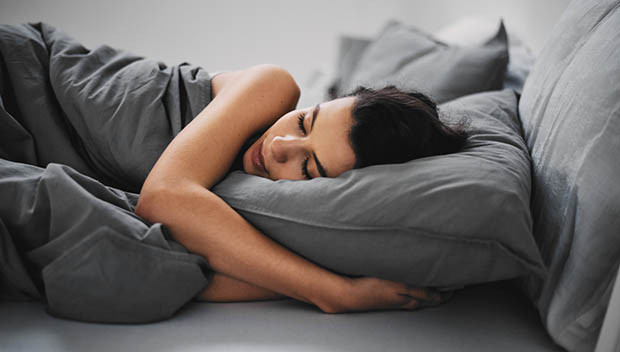
Sleep is extremely important for our health. According to the Centers for Disease Control and Prevention, not getting enough sleep has been linked to an increased risk of diabetes, stroke, high blood pressure, heart disease, obesity, poor mental health and even early death.
If you're serious about taking charge of your health this year, sleep is the first place to start. To get better sleep, it's important to have good "sleep hygiene," or good habits around sleep. By making these small tweaks, your Zzz's will improve tremendously.
MORE: The 12 Best Cooling es for Active People
No screens in the bedroom.
There is perhaps no sleep hygiene rule more important in today's modern world than eliminating screens from the bedroom. That means TVs, laptop computers, tablets and, yes, smartphones.
For anyone who has tried to follow a lighter version of this rule—"My phone is going to stay on the nightstand, but I promise I won't touch it!"—then you know what a slippery slope this can be. Do yourself a favor: Cut your electronics out of the bedroom completely and never look back.
Cut out screens one hour before bed.
Speaking of screens, if you struggle to feel sleepy, your screen usage is likely to blame. Blue light transmitted by electronics can interfere with your natural circadian rhythms, promoting wakefulness when you should be feeling tired. In other words, your brain isn't getting the "wind down" signal. Stop all screen usage one hour before bed, so your brain can recognize it's time for sleep.
Be consistent with your sleep schedule.
According to the National Sleep Foundation, adults should get 7 to 9 hours of sleep each night. To get consistent sleep, you need to keep the same sleep schedule throughout the week—that means weekends too. It can be tempting to sleep in on Saturday and Sunday to "catch up" on sleep, but this only sabotages your weekday efforts since you'll likely go to bed late on Sunday and feel extremely groggy on Monday morning. Keep a consistent schedule every day of the week that guarantees the recommended amount of sleep, and you won't need to catch up on the weekend.
Watch your caffeine and alcohol consumption before bed.
Both caffeine and alcohol can interfere with your quality of sleep, especially when consumed in the evening. Make sure to keep your last cup of coffee to the early afternoon. The longer you can go between caffeine consumption and bedtime, the better. Since alcohol is a depressant it can make you feel tired, but it actually interferes with sleep quality, even preventing REM sleep, which is the most restorative type.
Don't eat a large meal before bed.
Just like you need to watch what you drink before bed, you also need to watch what you eat. Large, heavy meals close to bedtime can lead to gastrointestinal distress and interfere with your sleep quality. If you're often hungry before bed, stick to a light but satiating snack with simple ingredients that you know your stomach can handle.
Exercise regularly
Add better sleep to the many health benefits of regular exercise. But remember, regular exercise doesn't have to mean brutal HIIT workouts. Thirty minutes of moderate aerobic exercise is all you need to notice a difference with your sleep. Even a simple walking routine can help keep your sleeping patterns on track.
MORE: The 11 Best Mattresses for Athletes
Lower your thermostat.
There's a chance your thermostat could be negatively influencing your sleep. Humans sleep best in cool spaces, so it's important to keep the temperature low at night. For optimal comfort, 60 to 67 degrees is the ideal range. Your body temperature actually goes down when you fall asleep, so a colder bedroom can help facilitate this process.
Do at least one consistent thing each night to signal bedtime.
You've probably seen wellness influencers talk about their nighttime routine on social media. It usually looks like an herbal tea, followed by a lavender oil and Epsom salt bath, followed by a 20-minute meditation, followed by gratitude journaling. Though inspirational, it's hardly realistic for most of us.
Instead of creating some elaborate, multi-step routine, pick one consistent habit you can practice before bedtime. Maybe you take a quick, 20-minute bath each night or you do a couple of relaxation exercises—whatever it is, keep it consistent. When repeated over time, this act alone will signal it's time to wind down for bed.
Drink less water
Do you make frequent trips to the bathroom at night? This is known as nocturia, or the frequent need to urinate at night, and it's especially common in older adults. Though waking up once to use the bathroom is considered normal, two or more trips to the bathroom can increase daytime tiredness. For most of us, nocturia is alleviated by reducing nighttime liquid consumption. Start to decrease all liquids two hours before bed and stay away from tea, alcohol and coffee during the evening hours since these stimulate urine production.
Leave the bedroom if you can't sleep.
Lastly, if you find yourself unable to sleep, it's important to get out of bed and leave the bedroom. Lying awake for hours at a time can cause you to associate your bed with wakefulness and even frustration. Simply get up, leave the room, go engage in another restful activity (such as reading) and return to your mattress once you are feeling tired again.
READ THIS NEXT: 13 Habits Hurting Your Sleep


